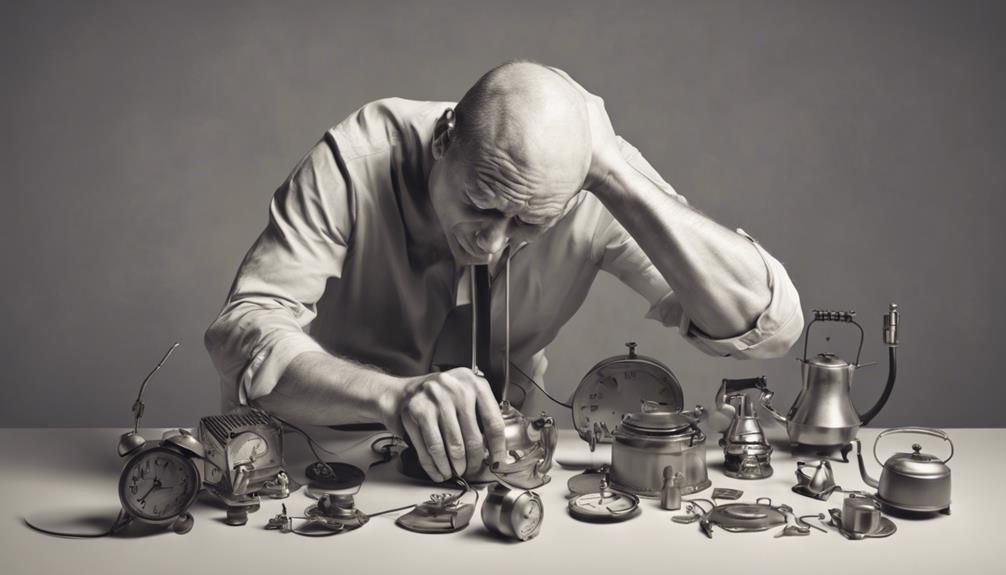When it comes to silencing the constant whistle, we’ve all experienced it, trying to savor a moment of tranquility only to have it ruined by that unwelcome noise. But don’t worry, there are practical solutions we can implement to address this annoyance directly.
From understanding the root causes to implementing effective techniques, our guide will equip you with the tools to regain tranquility in your hearing experience.
So, let's uncover the secrets to stopping that pesky whistle in its tracks and reclaim the serenity you deserve.
Key Takeaways
- Clear ear canal obstructions to prevent whistling disruptions in hearing aids.
- Adjust settings and ensure proper fit to minimize unwanted whistling sounds.
- Seek professional help for adjustments and cleaning to optimize hearing aid performance.
- Minimize background noise, use feedback cancellers, and maintain hearing aids regularly for tranquility.
Understanding Whistling Noises
When dealing with hearing aids, understanding the causes of whistling noises is crucial for effective troubleshooting. Whistling noises can result from various factors such as earwax buildup and microphone obstructions. Excessive earwax accumulation in the ear canal can interfere with the proper function of hearing aids by blocking sound amplification, which may lead to feedback and whistling sounds. Clearing the ear canal of excess earwax is essential to prevent such issues.
Additionally, obstructions in the microphone of the hearing aid can also contribute to whistling noises. Checking for any blockages in the microphone and ensuring it's clean and unobstructed can help reduce unwanted sounds.
To address whistling noises in hearing aids effectively, it's recommended to consult with an audiologist. They can provide adjustments, clean the devices, and ensure proper fitting, all of which are crucial for optimal hearing aid performance. By addressing the root causes of whistling noises, such as earwax buildup and microphone obstructions, individuals can prevent further disruptions and enjoy improved functionality from their hearing aids.
Identifying Common Sources

To better understand the causes of ear whistling, it is essential to identify common sources that include tinnitus, hearing aids, and environmental factors like loud noises. Tinnitus, often associated with hearing loss, can manifest as various sounds, including whistling. Whistling in the ear can be managed by using hearing aids to reintroduce sound and diminish the sensation. Hearing aids are crucial in addressing whistling caused by a lack of noise in the ear or improper fitting. Consulting an audiologist for adjustments in fitting or addressing excessive earwax can significantly enhance hearing aid performance and reduce whistling occurrences.
| Common Sources | Description | Solution |
|---|---|---|
| Tinnitus | Often linked to hearing loss, can result in various sounds, including whistling | Consult an audiologist for evaluation and management |
| Hearing Aids | May cause whistling due to lack of noise in the ear or improper fitting | Get professional help for proper fitting and adjustments |
| Loud Noises | Environmental factors like loud noises can also lead to temporary whistling in the ear | Use ear protection in noisy environments to prevent damage and reduce the likelihood of whistling |
Implementing Noise Reduction Techniques
Implementing techniques to reduce noise, such as adjusting hearing aid settings, is essential in minimizing whistling occurrences in the ear. Ensuring the proper fit and placement of hearing aids is crucial to prevent sound leakage, which can lead to whistling. Regular maintenance, including cleaning the hearing aids and checking for any obstructions, can also help minimize whistling issues. If whistling persists, seeking professional help to adjust the hearing aid settings or address earwax buildup is recommended.
Using hearing aids equipped with advanced feedback cancellation technology can be highly effective in reducing whistling sounds. This technology works by distinguishing between the sounds you want to hear and feedback, preventing the annoying whistling noise. By taking these steps and utilizing modern features like feedback cancellation technology, individuals can enjoy clearer and more comfortable hearing experiences. Remember, a well-fitted hearing aid with appropriate settings is key to reducing whistling and improving overall hearing quality.
Creating a Tranquil Environment

Creating a tranquil environment can significantly reduce the occurrence of hearing aid whistling. By minimizing background noise and ensuring proper fit and placement of your hearing aids, you can create an environment that promotes peace and quiet. Utilizing hearing aid feedback cancellers and noise reduction features can also help prevent whistling sounds, enhancing your overall listening experience. Adjusting the volume settings to a comfortable level is essential in avoiding whistling, as excessively high volumes can lead to feedback issues. Regularly cleaning your hearing aids and removing earwax buildup is crucial for optimal performance and to prevent unwanted whistling noises.
| Tips for Creating a Tranquil Environment |
|---|
| Minimize background noise |
| Ensure proper fit and placement |
| Use hearing aid feedback cancellers |
| Adjust volume settings appropriately |
| Regularly clean hearing aids |
Seeking Professional Assistance
Seeking assistance from a professional audiologist can provide valuable insights into diagnosing and addressing the cause of whistling in your hearing aids. Audiologists have the expertise to make necessary adjustments to the fitting of your hearing devices, which can help prevent sound leakage and reduce whistling noise.
They can also examine and address issues such as excessive earwax blocking the functionality of the hearing aids or problems with the microphone that may be causing the whistling. By consulting with an audiologist, you can receive personalized guidance and tailored solutions to effectively manage and eliminate the whistling in your hearing aids.
Their specialized knowledge in hearing devices allows them to offer comprehensive care to ensure that your hearing aids function optimally without any disruptive noises. If you're experiencing persistent whistling in your hearing aids, seeking professional assistance from an audiologist is a proactive step towards resolving this issue.
Frequently Asked Questions
How Do I Get Rid of the Whistling Sound in My Ear?
To stop the whistling sound in our ears, we must first ensure our hearing aids fit properly and that there's no excess earwax causing feedback. Checking for obstructions near the microphone is crucial.
Consulting an audiologist for adjustments and earwax removal can enhance our hearing aid's performance. Addressing these issues effectively reduces whistling sounds and improves our overall hearing experience.
How Can I Stop My Hearing Aid Whistling?
To stop hearing aid whistling, we recommend ensuring proper fit, cleaning regularly, and checking for obstructions. These steps can prevent sound leakage, earwax buildup, and microphone blockages that cause whistling.
Consult an audiologist for adjustments if needed. Addressing issues like fitting and earwax buildup can minimize or eliminate whistling, improving your hearing aid performance and overall experience.
Why Do I Keep Hearing a Whistle Noise?
We keep hearing a whistle noise due to various factors like improper fitting, earwax buildup, or microphone blockages. This can lead to sound leakage and feedback loops. Seek professional help to diagnose and address the issue.
Adjusting the hearing aid fit, cleaning out earwax, or managing tinnitus with specialized aids can help reduce these whistling sounds. Proper care and maintenance of hearing aids are essential for optimal performance and comfort.
Can Tinnitus Go Away?
Yes, tinnitus can go away, especially if it's temporary and related to a specific cause like exposure to loud noise. However, chronic tinnitus lasting over six months is less likely to resolve spontaneously. Seeking professional help for persistent symptoms is crucial.
Treatment options such as sound therapy, counseling, and relaxation techniques can help manage tinnitus. It's important to consult with an audiologist or ENT specialist for guidance on addressing bothersome tinnitus symptoms.
Can the Techniques for Stopping Hearing Aid Chiming Also Help with Whistling?
Stopping hearing aid chiming can be achieved by employing various techniques. However, it is important to note that these techniques might not directly address whistling issues. If you are wondering how to fix hearing aid chiming specifically, exploring methods like adjusting volume settings, cleaning the device, or ensuring a proper fit can be effective. Nevertheless, for whistling problems, seeking professional assistance is recommended to identify and resolve the specific cause.
Conclusion
In conclusion, addressing the root causes of whistling noises when using hearing aids is crucial for maintaining a peaceful auditory experience. By understanding the sources of the issue, implementing noise reduction techniques, and seeking professional assistance when needed, individuals can enjoy clearer hearing without the distraction of whistling sounds.
It's important to investigate the truth of the theory that proper fitting, cleanliness, and microphone obstructions play a significant role in eliminating whistling noises for a more comprehensive approach to managing hearing aid issues.










